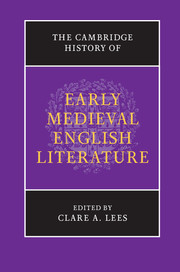Book contents
- Frontmatter
- Contents
- List of Illustrations
- List of Contributors
- Acknowledgements
- List of Abbreviations
- Introduction: literature in Britain and Ireland to 1150
- I WORD, SCRIPT AND IMAGE
- II EARLY ENGLISH LITERATURE
- III LATIN LEARNING AND THE LITERARY VERNACULARS
- 19 In measure, and number, and weight: writing science
- 20 Legal documentation and the practice of English law
- 21 Latinities, 893–1143
- 22 The authority of English, 900–1150
- 23 Crossing the language divide: Anglo-Scandinavian language and literature
- 24 European literature and eleventh-century England
- 25 Gaelic literature in Ireland and Scotland, 900–1150
- 26 Writing in Welsh to 1150: (re)creating the past, shaping the future
- Bibliography
- Index of manuscripts
- Index
19 - In measure, and number, and weight: writing science
from III - LATIN LEARNING AND THE LITERARY VERNACULARS
Published online by Cambridge University Press: 05 February 2013
- Frontmatter
- Contents
- List of Illustrations
- List of Contributors
- Acknowledgements
- List of Abbreviations
- Introduction: literature in Britain and Ireland to 1150
- I WORD, SCRIPT AND IMAGE
- II EARLY ENGLISH LITERATURE
- III LATIN LEARNING AND THE LITERARY VERNACULARS
- 19 In measure, and number, and weight: writing science
- 20 Legal documentation and the practice of English law
- 21 Latinities, 893–1143
- 22 The authority of English, 900–1150
- 23 Crossing the language divide: Anglo-Scandinavian language and literature
- 24 European literature and eleventh-century England
- 25 Gaelic literature in Ireland and Scotland, 900–1150
- 26 Writing in Welsh to 1150: (re)creating the past, shaping the future
- Bibliography
- Index of manuscripts
- Index
Summary
None of the practices by which modern science defines itself – the collection of empirical data, the formulation of explanatory hypotheses, rigorous testing, replicable experiments – existed in any systematic form in early medieval England. There was no scientific community founded on these shared principles and no institutional structure dedicated to ‘science’ that certified its practitioners and upheld its standards. The philosophical postulates on which post-Newtonian science rests, such as the assumption that physical laws are uniform and consistent across time and space, were not formulated and would not necessarily have been accepted. Neither the empiricism of Aristotelian natural science nor the methods of Euclidean geometry – the reduction of the irregular realia of experience to a brilliantly clear chain of axioms, postulates and proofs – was available to the Anglo-Saxons. For these reasons most histories of science, tracing the roots of a modern idea, pass quickly over a period so apparently alien to their interests.
And yet the mental habits on which science depends – curiosity, speculation, the trial-and-error of experimentation, the application of experiential knowledge to the manipulation of the material world – certainly existed in Anglo-Saxon England, as they have existed in most times and places. If scientific texts were generally scarce, traditional knowledge and skills were plentiful. Whatever skills and knowledge individuals may have possessed, improved and transmitted, however – in agriculture, engineering, metallurgy, astronomy or physiology – do not seem to have existed within a theoretical framework, or rather their theoretical framework was not generally an object of inquiry in itself. Much of this knowledge served as a means to a practical end – how to build, grow, cure, tell time; it might be characterized as craft rather than science, ‘knowing how’ rather than ‘knowing why’ or ‘knowing about’. The separation of craft and industry from the centres of education and the learned traditions where classical texts were known foreclosed one of the most fruitful venues of exchange for the development of a scientific method in later centuries.
- Type
- Chapter
- Information
- The Cambridge History of Early Medieval English Literature , pp. 475 - 498Publisher: Cambridge University PressPrint publication year: 2012



